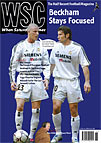 Millwall's fight against the hooligans looks to have succeeded but, as Lance Bellers writes, the troublemakers won't be the only ones missing out on the FA Cup Final this month
Millwall's fight against the hooligans looks to have succeeded but, as Lance Bellers writes, the troublemakers won't be the only ones missing out on the FA Cup Final this month
Picture this: your team have just reached football’s most famous cup final for the first time. Imagine the scenes at the first home match after the semi-final: a sea of flag-waving happy faces, drunk on euphoria and the doors locked an hour before kick-off.
Well, actually, at Millwall’s home match against Cardiff, three days after beating Sunderland, I counted one limp flag held by an uninterested boy on the halfway line and you couldn’t possibly count all the empty seats in a crowd of just 9,584. How could this happen? Two words: membership scheme.
Following the riot that erupted after the Birmingham play-off match at The Den two years ago, Millwall chairman Theo Paphitis decided to do something none of his predecessors had ever had the balls to carry out: take on the hooligans. Not pay lip service to doing so, but to actually deal with the problem once and for all. To see it through, even when it results in a whole upper tier at Old Trafford being left empty, hitting the club in the pocket and giving a poor image of Millwall’s support. To me, amazed and delighted as the final whistle blew at the semi, that block of 10,000 empty seats symbolised the fine efforts of Theo over the past few years, a symbol of his integrity and ability to stick to his guns.
Millwall took over 47,000 to the Auto Windscreens final against Wigan at Wembley not so long ago, proof the fairweather fan base is there. With the possible exception of restrictions on England’s travelling support, Millwall’s membership scheme is unique in football. To join, and be able to see any of the high-profile matches, the potential flashpoints, you have to present two forms of identity (a passport and utility bill, usually) and pay a fiver. Not a big ask, but enough to put off a lot of people. I know a few Millwall fans who have been fairly regularly to low-key games this season but have not got around to joining. They now face the prospect of missing out on a Cup final. Millwall even closed the door after the quarter-final against Tranmere, stopping anyone from joining.
It all seems a touch harsh and now Manchester United are taking the majority of the final tickets I can’t help feeling that has to be a result of those empty seats at Old Trafford, a form of punishment for the tight restrictions Millwall have imposed on themselves. But it all boils down to tackling the awful reputation the club have had to endure. The scheme means home games such as against Cardiff are no longer a free-for-all for troublemakers. Even after the semi-final, no casual fan could go down to enjoy the moment. Cardiff fans had to buy tickets in advance and it was members only in the home areas. It was the same for the 4-1 thumping of West Ham, one of the finest performances by a Millwall side for many years. Even for that, only 14,055 were there.
The thing is, though, that it has worked. There has hardly been a sniff of trouble since that night against Birmingham. And Theo certainly was not going to take any chances against Sunderland with heavy media coverage of the day. In fact, I saw thousands of fans of both sides mingling before and after the match and I sensed no friction, no threat, nothing. Practically a love-in by Millwall standards.
Home crowds are meagre, hovering around 10,000 in an historic season. In the first season of the membership, something went out of the club. It was an awful year, mediocre play in front of mediocre crowds, both fuelling the other in a downward spiral. However, there may be a simpler explanation. In the early matches of the first season, areas of the ground populated by the baseball-cap wearing hoolie types were now empty. Not thinly populated, but empty. Some knew the authorities had their photos from the riot and were after them. Perhaps a hefty percentage of our following really were hooligans, simple as that.
The great irony is that Theo Paphitis has said he had planned to leave the club two years ago but after the Birmingham troubles he decided that he couldn’t walk away, there was too much to do, too much to put right. I like to think that the extraordinary high of clinching the place in the last two of the FA Cup was a kind of payback for all his efforts.
From WSC 208 June 2004. What was happening this month